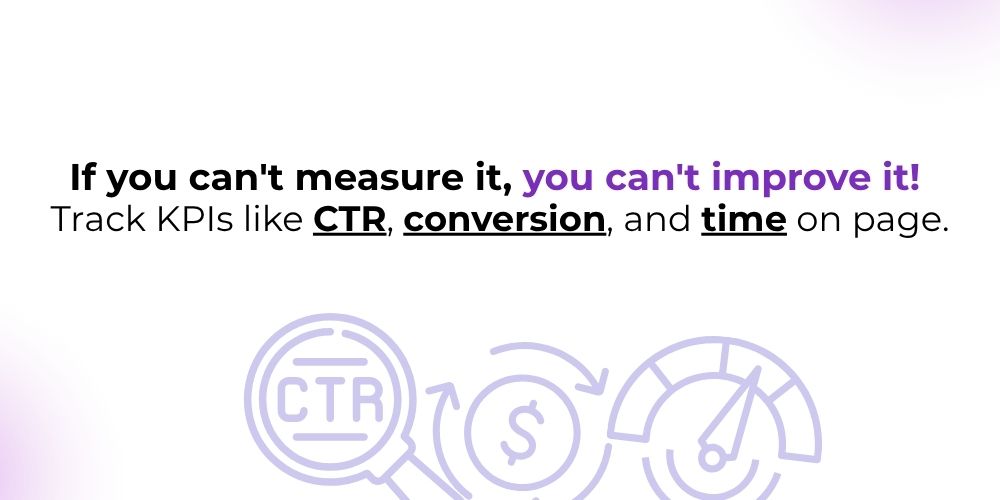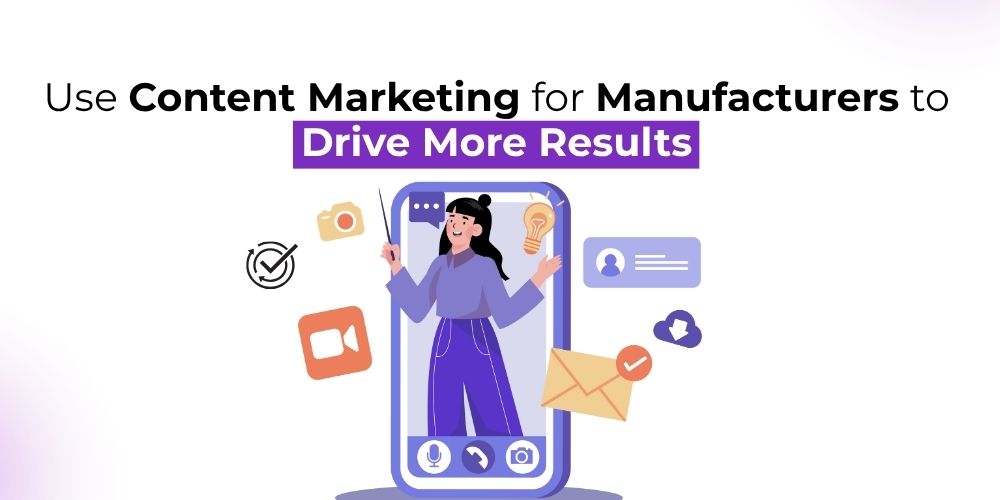Many manufacturers build amazing products, but struggle to get noticed online. The problem isn’t the product, it’s how people now search for solutions. Buyers aren’t flipping through catalogs or making calls anymore.
Instead, they’re using search engines, reading blogs, watching videos, and comparing vendors online before reaching out. That’s where content marketing for manufacturers becomes essential.
Creating useful content helps you show up where your customers are looking. Whether it’s through SEO for manufacturing companies, product demo videos, or case studies that highlight your success, every piece of content helps you build trust.
We’ve seen industrial content marketing work across sectors, from precision tools to automation systems, turning technical topics into clear, engaging resources.

This not only helps with lead generation for manufacturers through content, but also strengthens your brand’s authority.
Smart manufacturing content marketing strategies include writing blog posts, sharing knowledge on social media for manufacturing businesses, using email marketing for manufacturers, and even trying video marketing for manufacturers.
If you want to move from being just another supplier to a go-to expert in your field, content isn’t optional, it’s your advantage.
Why Content Marketing is Essential for Manufacturers
Manufacturers work in a space where precision and performance matter, and the same should apply to how they reach potential buyers.
Content marketing for manufacturers helps turn technical details into clear, useful content that attracts the right audience.
When done well:
- It builds trust by answering common buyer questions before a sales rep is involved.
- It improves lead quality, as people who engage with your content are often already interested.
- It helps shorten the sales cycle because prospects understand your value early on.
We recently helped an electronics manufacturer in the UAE who relied mainly on trade shows. They weren’t getting results online.
So, we focused on manufacturing content marketing strategies, writing blogs on energy-efficient parts, using SEO for industrial websites, and sharing those as guides through email marketing for manufacturers. Within six months, their leads doubled, and they were talking to actual decision-makers.
For today’s market, digital marketing for manufacturing isn’t optional, it’s essential. With the right mix of blog posts, product videos, technical guides, and case studies, content becomes more than a tool. It becomes your best salesperson.
How to Use Content Marketing for Manufacturers to Drive Leads
Understanding the Manufacturing Audience
When it comes to content marketing for manufacturers, treating all buyers the same doesn’t work.
In the manufacturing industry, your audience includes engineers, procurement teams, plant managers, and executives, and each group cares about different things.
For example, a client in industrial robotics had two key audiences. Engineers were looking for technical specs and detailed comparisons, while procurement teams wanted cost breakdowns and faster delivery options.

So we created different content for each: tech blogs and product demos for the engineers, and case studies plus ROI tools for the procurement folks.
If you’re working on manufacturing content marketing strategies, here are a few simple tips:
- Break down your audience into clear groups.
- Use tools to research what each group is searching online, great for SEO for industrial websites.
- Talk to your current customers to find out what matters to them.
- Choose content types that match their needs, like blogs, videos, or even email marketing for manufacturers.
Whether you’re doing B2B content marketing for manufacturers or improving lead generation through content, understanding your audience is the first step to creating real impact.
Setting Clear Goals for Content Marketing
Content marketing for manufacturers works best when it’s tied to clear goals. Without direction, even great content can get lost. We always start by asking: what does success look like for your business?
For one sheet metal company in Dubai, the focus was on increasing visibility in the MENA region, getting more RFQ inquiries through organic search, and helping customers understand when to use aluminum instead of steel.
So, we built a simple but focused plan:
- Publish 10 SEO-friendly blog posts each quarter (using manufacturing blog ideas and keywords).
- Create one lead magnet monthly, CAD files, case studies, or product demos.
- Aim for a 20% increase in form submissions within six months.
Some tips that helped:
- Match your KPIs to your business goals, leads, email marketing for manufacturers, or content downloads.
- Track everything using tools like Google Analytics or HubSpot.
- Share your content goals with your internal team, so everyone stays on the same page.

It could be any kind of content marketing; be it technical or video for manufacturers, knowing your targets turns every blog or post into a real step toward business growth.
Crafting High-Quality Content
Creating good content isn’t about writing endless blog posts. It’s about sharing useful information your audience can actually use.
When it comes to content marketing for manufacturers, the best approach is to keep it educational, technical when needed, and easy to understand.
Some content types that work well:
- Blog articles that answer real questions, like “How to pick the right industrial motor.”
- Case studies that show results and build trust with potential buyers.
- Short videos or product demos that explain how your machines work.
- White papers or guides for engineers who want detailed information.
For example, we worked with a CNC company to build helpful content. We spoke with their engineers, wrote blog posts about tolerances, made guides on machine compatibility, and filmed quick shop-floor videos.
This led to more search traffic and even brought in leads from industries they hadn’t targeted before.
Manufacturing content marketing strategies aren’t just about explaining products, they’re about reaching the right people.
No matter if it’s SEO for industrial websites, video marketing for manufacturers, or email marketing for manufacturers, the goal is the same: grow trust, get found, and generate real business.
SEO Strategies for Manufacturing Content
You can create amazing content, but if no one can find it online, it won’t help your business grow. That’s why content marketing for manufacturers must go hand in hand with smart SEO.
Instead of just using keywords randomly, focus on what your audience is actually searching for.
For example, terms like “energy-saving machines for factories” or “automation tools for packaging” work better than generic product names. Use them in titles, image tags, and headings.
Link related content together, like product pages, blog posts, and FAQs, so search engines understand what your site is about. This helps improve visibility for industrial content marketing.
We helped a manufacturer get better results by organizing content by usage (like “cooling for server rooms”) instead of by product model. This approach boosted their rankings and traffic.
Also, don’t ignore local SEO. If you serve specific regions, include local keywords and update your business listings.
Good SEO for manufacturing companies isn’t about tricks, it’s about clear structure, helpful content, and understanding your buyers.
Done right, it drives more leads and supports your overall digital marketing for manufacturing efforts.
Using Visual Content to Showcase Manufacturing Processes
When it comes to content marketing for manufacturers, visuals speak louder than words. Manufacturing is hands-on, so your content should reflect that. Instead of just explaining how your process works, show it.
A short product demo or factory walkthrough video can explain complex processes quickly and clearly. These are a few formats that work well in manufacturing content marketing strategies:
- A time-lapse of your assembly line in action
- Animated diagrams to explain product features
- Infographics that highlight energy savings or production speed
- Side-by-side comparisons with competitors’ products
For example, a manufacturer we worked with created a simple video comparing their conveyor belt with a competitor’s. It was shared in an industry newsletter and led to over 10 sales inquiries in just one week.
Visuals help you build trust and showcase precision, something that’s essential in industrial content marketing.

Even if you’re doing SEO for manufacturing companies or focusing on lead generation for manufacturers through content, strong visuals can boost results.
Especially in B2B content marketing for manufacturers, showing the value of your product works better than just describing it.
Leveraging Social Media for Manufacturing Marketing
Content marketing for manufacturers is no longer limited to brochures and trade shows. Today, platforms like LinkedIn, YouTube, and even Instagram are helping manufacturing businesses connect with a wider audience in a more personal way.
Here’s what works well:
- Share updates or technical insights on LinkedIn to build trust and show expertise.
- Use YouTube for product demos or to explain how your machines solve real problems.
- Show behind-the-scenes work on Instagram to highlight your team and processes.
We helped a precision casting company post weekly client success stories, simple before-and-after photos and short captions.
Within six months, their followers grew by over 200%, and they received new partnership requests.
Manufacturing content marketing strategies don’t need to go viral to be effective. What matters is being consistent and authentic. For video marketing for manufacturers or creating case studies, the goal is to stay visible and valuable.

For strong lead generation for manufacturers through content, focus on real stories, regular updates, and clear messaging. Content creation for manufacturers works best when it’s useful, honest, and tailored to your audience.
Utilizing Thought Leadership and Industry Authority
You don’t need to have 50 years in business to be a leader. You just need a perspective and the courage to share it.
Write deep-dive blogs. Speak at webinars. Publish predictions. Interview your engineers. Authority is built, not claimed.
We helped a green manufacturing startup build authority by creating a “State of Sustainable Materials” report, compiling insights from 100+ manufacturers. That one report brought backlinks from 20+ sites and several podcast invitations.
If you know something valuable, publish it.
Email Marketing for Manufacturers
Email marketing for manufacturers still works, when it’s done right. Sending useful, timely emails helps build trust and keeps your audience engaged.
Instead of sending the same message to everyone, smart manufacturing content marketing strategies focus on personalization.
We create segmented email lists based on industry, interest, or past actions. For example, if someone watches a product demo or downloads a guide, they get a follow-up email with more helpful content, not just a sales pitch.
One B2B content marketing campaign for a precision tools client used a short email, a video demo, and a link to FAQs. The result? Over 50 appointments booked from one email.
This approach is part of a bigger strategy around content marketing for manufacturers.
It ties into SEO for manufacturing companies, social media for manufacturing businesses, and lead generation for manufacturers through content. It’s about sharing the right message at the right time to the right people.
Don’t just send emails, start conversations. With thoughtful content creation for manufacturers, even one email can lead to long-term results.
Paid Media Campaigns for Content Amplification
Even the best content needs a little help to reach its full potential, especially in content marketing for manufacturers. Paid media campaigns can amplify your efforts and increase visibility.
Here are some effective paid strategies:
- Use Google Ads to target specific machinery and industrial terms.
- Promote lead-generating content, like white papers, through LinkedIn Sponsored Posts.
- Retarget website visitors with personalized invitations for product demos or webinars.
For example, we designed a paid content funnel for an industrial automation brand. Visitors who read a blog were retargeted with a webinar invite, followed by a demo call-to-action. This approach led to a 16% conversion rate.
In the world of B2B content marketing for manufacturers, sometimes a small investment in paid ads can turn high-quality content into lasting returns.
Paid strategies can accelerate lead generation for manufacturers through content and help boost visibility across industrial content marketing channels, from social media for manufacturing businesses to email marketing for manufacturers.
Tracking and Analyzing Content Performance
When it comes to content marketing for manufacturers, tracking performance is key to improving your strategy. Without measuring, you’re just guessing.
Here’s how you can track content success:
- Monitor traffic based on the source and type of content.
- Track leads from gated content, forms, and calls to action (CTAs).
- Measure conversion rates from website visitors to marketing qualified leads (MQLs).
- Analyze engagement metrics like time on page, bounce rate, and social shares.
To get the best results, use tools like:
- Google Analytics for overall website performance.
- HubSpot or ActiveCampaign for lead generation and email marketing for manufacturers.
- Hotjar to see visual heatmaps and understand user behavior.
A client in the manufacturing logistics industry discovered their most popular blog lacked a clear call to action. After improving the CTA, their lead captures increased by 31%.

Data is your best friend when it comes to B2B content marketing for manufacturers. It helps you identify which strategies work, so you can continue to improve your industrial content marketing and drive more qualified leads.
Effective content marketing for manufacturers is all about understanding what resonates with your audience and making adjustments based on insights.
Summary
Content marketing for manufacturers is less about hype and more about helping. When done right, it becomes the silent engine behind sales, awareness, and trust.
Every client we’ve worked with had unique needs, but the strategies that work are often the same: clarity, consistency, and empathy. In the same way great engineering solves real problems, great content should answer real questions.
And if you’re looking to turn complex products into simple, searchable, shareable insights, we’d love to explore that with you. Let’s turn your factory floor into your next lead magnet.






